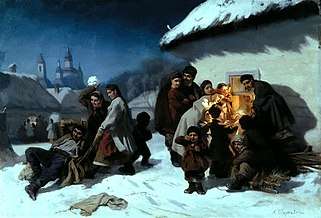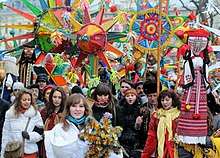Koliada
Koliada or koleda (Cyrillic: коляда, коледа, колада, коледе) is an ancient pre-Christian Slavic winter festival. It was later incorporated into Christmas.[1]
| Koliada | |
|---|---|
 | |
| Also called | Kolyada, Коледа, Kоляда, Коледе, Kalėda, Colindă |
| Observed by | Eastern European and Slavic people |
| Significance | celebration of New Year birth |
| Begins | January 6 |
| Ends | January 7 |
| Date | December 25, January 7, January 6, December 24 |
| Related to | Christmas traditions, Eastern Orthodox liturgical days |

Terminology
The word is still used in modern Ukrainian ("Коляда", Kolyadá), Belarusian (Каляда, Kalada, Kaliada), Russian (Колядá, Kolyada), Polish (Szczodre Gody kolęda [kɔˈlɛ̃da]), Bulgarian, Macedonian, Serbian (Коледа, Коледе) Lithuanian (Kalėdos, Kalėda) and Bosnian, Croatian, Czech, Slovak, Slovene (koleda).[2]
The word used in Old Church Slavonic language (Колѧда - Kolęnda) sounds closest to the current Polish language pronunciation, as Polish is one of two Slavic languages which retains the nasal vowels of the Proto-Slavic language (the other is closely related Kashubian). One theory states that Koliada is the name of a cycle of winter rituals stemming from the ancient calendae.[1]
Some claim it was named after Kolyada, the Slavic god of winter or Koliada, the goddess who brings up a new sun every day.[3]
In modern Ukrainian, Belarusian, Russian (koliada), Czech, Slovak, Croatian (koleda), Kashubian (kòlãda [kwɛlãda]), Romanian (colindă) and Polish (kolęda [kɔˈlɛ̃da], Old Polish kolenda[4]) the meaning has shifted from Christmas itself to denoting the tradition of strolling, singing, and having fun on Christmas Eve, same in the Balkan Slavs. It specifically applies to children and teens who walk house to house greeting people, singing and sifting grain that denotes the best wishes and receiving candy and small money in return. The action is called kolyadovannya (Russian: Колядования) in Ukrainian and is now applied to similar Old East Slavic celebrations of other old significant holidays, such as Generous Eve (Belarusian: Шчодры вечар, Ukrainian: Щедрий вечiр) the evening before New Year's Day, as well as the celebration of the arrival of spring. Similarly in Bulgaria and North Macedonia, in the tradition of koleduvane (коледуване) or koledarenje (коледарење) around Christmas, groups of kids visiting houses, singing carols and receiving a gift at parting. The kids are called 'koledari' or rarely 'kolezhdani' who sing kolyadki (songs).
Koleda is also celebrated across northern Greece by the Slavic speakers of Greek Macedonia, in areas from Florina to Thessaloniki, where it is called Koleda (Κόλιντα, Κόλιαντα) or Koleda Babo (Κόλιντα Μπάμπω) which means "Koleda Grandmother" in Slavic. It is celebrated before Christmas by gathering in the village square and lighting a bonfire, followed by local Macedonian music and dancing.
Croatian composer Jakov Gotovac wrote in 1925 the composition "Koleda", which he called a "folk rite in five parts", for male choir and small orchestra (3 clarinets, 2 bassoons, timpani and drum). There is also a dance from Dubrovnik called "The Dubrovnik Koleda."
See also
| Wikimedia Commons has media related to Koliada. |
- Korochun
- Crăciun (disambiguation)
- Twelfth Night (holiday)
- Yule
- Colindă, a similar Romanian/Moldovan tradition
- Christmas carol
- Kolyadka
- Koledovanie
- Turoń
- Koleda (Koledovanie) in the Serbian tradition
- Shchedryk (song)
- Calennig
- Christmas Waits
- Beltane, Gaelic festival in honour of the sun
References
- Encyclopedia of Ukraine
- "Koleda". Slovar slovenskega knjižnega jezika [Standard Slovene Dictionary]. Slovene Academy of Sciences and Arts. 2000.
- "Archived copy". Archived from the original on 2013-07-30. Retrieved 2012-12-13.CS1 maint: archived copy as title (link)
- Biblioteka warszawska. 1858 s. 318, Materyały antropologiczno-archeologiczne i etnograficzne 1826 s. 186
